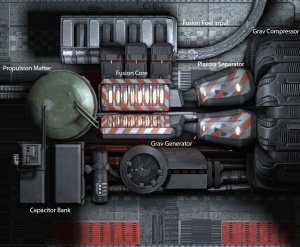Difference between revisions of "Tech Sublight Engines"
(Pywikibot v.2) |
|||
| (9 intermediate revisions by the same user not shown) | |||
| Line 1: | Line 1: | ||
| + | {{DISPLAYTITLE:Sublight Engines}} | ||
| − | + | {{Infobox tech | |
| + | |name=Sublight Engines | ||
| + | |image=[[image:reactorengine2.jpg|300px]] | ||
| + | |tech=Reactor Components | ||
| + | }} | ||
| − | + | Although [[Tech_Hyperspace|faster than light travel]] is possible, to do so is very power consuming, expensive and not to mention dangerous. Ships still need sublight-speed engines to move around in local space. The most common form of capital ship propulsion is with the use of fusion engines, rocket engines not using chemicals as fuel but fusion material. In most cases this would be deuterium, when not in use it is stored as simply water. | |
| − | The fusion | + | The fusion engines use the fusion material itself as reaction mass for propulsion. |
| + | For forward propulsion however it's cheaper to use plasma compression drives, fusion engines running on water and using smaller grav emitters to induce fusion with gravitational confinement. It's the most common setup for military vessels due to its reliability | ||
| + | |||
| + | Grav tech is used as the primary means of spaceship steering, through so-called grav fins. These fins, either in a form of actual wing-like structures or hidden within the hull, are synchronized arrays of grav emitters. By shaping the grav field they effectively apply a force that propels or rotates the whole ship. In this way an advantage is that the vessel only needs one grav engine for all the emitters, which can be hidden deep inside the armoured part of the ship, instead of multiple vulnerable maneuvering engines. | ||
| + | |||
| + | {{Navbox_tech}} | ||
| + | |||
| + | [[Category:Technology]] | ||
Latest revision as of 23:52, 20 August 2019
| Sublight Engines | |
|---|---|
 | |
| Tech | Reactor Components |
Although faster than light travel is possible, to do so is very power consuming, expensive and not to mention dangerous. Ships still need sublight-speed engines to move around in local space. The most common form of capital ship propulsion is with the use of fusion engines, rocket engines not using chemicals as fuel but fusion material. In most cases this would be deuterium, when not in use it is stored as simply water.
The fusion engines use the fusion material itself as reaction mass for propulsion. For forward propulsion however it's cheaper to use plasma compression drives, fusion engines running on water and using smaller grav emitters to induce fusion with gravitational confinement. It's the most common setup for military vessels due to its reliability
Grav tech is used as the primary means of spaceship steering, through so-called grav fins. These fins, either in a form of actual wing-like structures or hidden within the hull, are synchronized arrays of grav emitters. By shaping the grav field they effectively apply a force that propels or rotates the whole ship. In this way an advantage is that the vessel only needs one grav engine for all the emitters, which can be hidden deep inside the armoured part of the ship, instead of multiple vulnerable maneuvering engines.
| ||||||||||